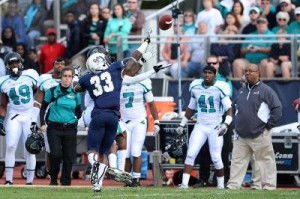As I was watching football on Saturday as CSU beat Coastal Carolina University, I couldn’t help but draw parallels to the work world. The team played well as a unit and there was no overcompensating for each other, allowing each individual to their jobs to the best of their abilities.
The CSU defensive coordinator was making bold moves to stifle the highly touted CCU offense they were playing. In football as with anything in life, when faced with a tough opponent a bland game plan won’t cut it. And CSU did not have a bland game plan. Often times they would blitz everyone on the field with the exception of their Cornerbacks, leaving them in what is known as “Cover Zero” meaning they have no help from a safety. Typically, there are more defensive backs or linebackers to help the Cornerbacks, but not when they are all blitzing. The Cornerbacks would match up with the wide receivers on the outside of the field and everyone else would rush the Quarterback. This is very effective at putting pressure on the offense, however it can be quite risky if the Cornerback doesn’t make a play when the ball is thrown his way. He is one-on-one with the Receiver and if the ball is thrown in his direction, he only has to beat that single Cornerback if he wants to get a touchdown. I loved this play calling because it made everyone on defense even more accountable for their play.
 The key for this to work is to have excellent Cornerbacks that play at a high level and do not let the Wide Receivers make any catches. CSU’s Cornerbacks came to play and had multiple pass-breakups in these situations. They did their job and forced Coastal Carolina to play 9 versus 9, eliminating the play of the receivers in those situations. When this happened, the other 9 defensive players could hone in on a fewer number of potential ball carriers and make plays faster. The defense could make decisions faster by eliminating the potential threat of the receivers. And the great part was that the other 9 players on defense didn’t try to do the Cornerbacks’ jobs for them, they did their own job during the play and then came together to talk about what worked and what didn’t work in between series.
The key for this to work is to have excellent Cornerbacks that play at a high level and do not let the Wide Receivers make any catches. CSU’s Cornerbacks came to play and had multiple pass-breakups in these situations. They did their job and forced Coastal Carolina to play 9 versus 9, eliminating the play of the receivers in those situations. When this happened, the other 9 defensive players could hone in on a fewer number of potential ball carriers and make plays faster. The defense could make decisions faster by eliminating the potential threat of the receivers. And the great part was that the other 9 players on defense didn’t try to do the Cornerbacks’ jobs for them, they did their own job during the play and then came together to talk about what worked and what didn’t work in between series.
How does this work in businesses? It plays out like this when we don’t need to cover for each other. A great sales team can cover up a flawed product for a while, but not if the company wishes to build a good reputation for quality products. And a great manager can put in overtime and work themselves to death with a sub-par team, but only for a short time before burnout sets in. There will always be a need for collaboration in the workplace, however when we start to do each other’s jobs because we don’t trust each other we begin to take a step backwards. That football team could never have won the game if the Linebackers and Safeties were overcompensating for the Cornerbacks by trying to help out. The best help they could give was to do their jobs to the best of their abilities and trust that their teammates do theirs.
Be the kind of co-worker/partner/contractor that does not need to be overcompensated for. As we do our jobs to the best of our abilities we become more valuable to our organizations, we build confidence, and we begin to take on more responsibility.
